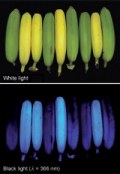Spliced feed for The Science Network |
| Election Special [Sciencebase Science Blog] Posted: 04 Nov 2008 02:00 AM CST
In Issue 100 of the relaunched ChemWeb Alchemist, we report on energy is top of the agenda with a record-breaking solar cell material from Australia. New insights into the ripening of bananas reveals they get the blues while crystallography has been thrown a curveball as scientists discover the active sites in many models of protein receptors are not what they seemed to be. The chemistry of alternative medicine sits toxically under the glare of the Alchemist’s lamp and revelations about yet another small molecule with a crucial role to play in cellular control. Finally, a double ACS award for research on the structure and reactivity of molecular oxygen binding to copper and iron complexes, which could have future energy applications. In SpectroscopyNOW this week, rather than designing and building new instrumentation from bespoke components, researchers in Canada have turned to the laser-based optical read-write technology of DVD and CD players to create a biomedical diagnostics system that requires no hardware modifications. Hua-Zhong “Hogan” Yu and his colleagues Yunchao Li, Lily M. L. Ou in the Department of Chemistry, at Simon Fraser University, in Burnaby, British Columbia, Canada, are all for recycling. They have now developed a digital signal readout protocol for screening disc-based bioassays that uses a standard optical drive (CD/DVD) from an ordinary desktop computer.
A gold star for SERS - Scientists at the National Institute of Standards and Technology (NIST) in Gaithersburg, Maryland, are using surface-enhanced Raman spectroscopy (SERS) to test the properties of star-shaped gold nanoparticles. They have found that these particles have optical qualities that outshine the competition and could make them useful in chemical and biological sensing and imaging. Athletic support - Researchers have used NMR to show that endurance-trained athletes have a higher resting muscle metabolism than couch potatoes. The work suggests that the dissociation of oxidation and adenosine triphosphate (ATP) production could be another route by which exercise improves insulin sensitivity and burns excess energy and may have implications for understanding the development of type 2 diabetes. Crystals foxed - Obtaining a high-resolution crystal structure of a protein, a receptor or an enzyme, for instance, has been at the forefront of the drug design field for many years. Finding small molecules that will dock with the active site of the protein and either stimulate it or inhibit it is the basis on which many pharmaceutical products were built and are thought to work. But, what if that fundamental concept were wrong? This is the sobering and at the same time very important conclusion made by researchers at Leiden University in The Netherlands and the Scripps Institute, La Jolla, California |
| Scientists boost oil with 'enhanced recovery' [Earth & Sky Podcast] Posted: 03 Nov 2008 04:11 AM CST Shell scientist Willem Schulte says advanced oil recovery technology could help us access vast amounts of oil that remain trapped underground. This posting includes an audio/video/photo media file: Download Now |
| You are subscribed to email updates from The Science Network To stop receiving these emails, you may unsubscribe now. | Email Delivery powered by FeedBurner |
| Inbox too full? | |
| If you prefer to unsubscribe via postal mail, write to: The Science Network, c/o FeedBurner, 20 W Kinzie, 9th Floor, Chicago IL USA 60610 | |
 Not really…I cannot imagine there is anyone in the world who is not fed up to the back teeth with the US election media saturation, debates and discussion about
Not really…I cannot imagine there is anyone in the world who is not fed up to the back teeth with the US election media saturation, debates and discussion about  Also, this week “Yes, we have
Also, this week “Yes, we have
No comments:
Post a Comment